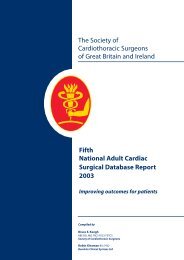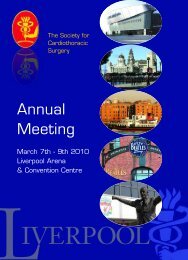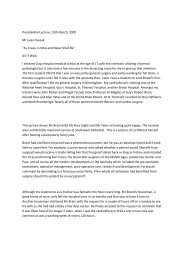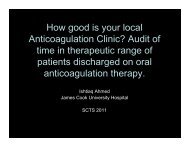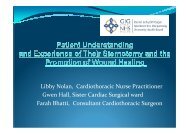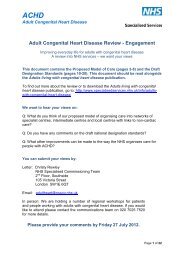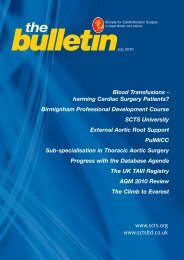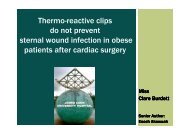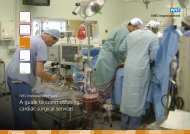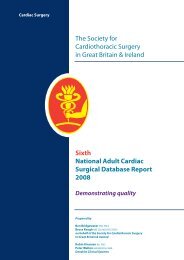Download - Society for Cardiothoracic Surgery
Download - Society for Cardiothoracic Surgery
Download - Society for Cardiothoracic Surgery
Create successful ePaper yourself
Turn your PDF publications into a flip-book with our unique Google optimized e-Paper software.
14 theBulletin<br />
December 2011<br />
How to get funding<br />
<strong>for</strong> basic research<br />
Gianni Angelini<br />
British Heart Foundation Professor of<br />
Cardiac <strong>Surgery</strong>, Bristol University and<br />
Imperial College London<br />
When I was a young trainee rather a long time ago, I went to<br />
see one of my mentors and told him that I was interested in<br />
doing some research, even though I had no idea where to<br />
start! He advised me “to identify a clinical problem you face<br />
every day in your practice, understand the mechanisms of<br />
action by using basic science and, with a bit of luck, you may<br />
be able to take the solution back into your clinical practice”.<br />
This was the most important advice that I ever received in my<br />
academic career. It is still relevant today <strong>for</strong> anyone who wants<br />
to carry out what is now fashionably called ‘translational<br />
research’.<br />
So how do you go about it?<br />
First, you need a good idea or, more scientifically, a “working<br />
hypothesis”. The next step is to do some serious background<br />
reading as, otherwise, you risk “reinventing the wheel”. It is<br />
most important to understand what is already known in order to<br />
be sure that question you are interested to answer is still<br />
worthwhile answering – don’t be surprised if you find the answer<br />
from the literature without doing any research! Once you are<br />
clear in your mind that you have a solid hypothesis which is<br />
going to involve basic science, look around in your institution to<br />
see if there are any scientists who may have a similar interest.<br />
You have to ask yourself a very<br />
honest question. Are you<br />
doing this because you have a<br />
genuine interest in research?<br />
I would then advise that you meet them and present your ideas.<br />
In my experience, basic scientists are always very keen to<br />
collaborate with clinicians <strong>for</strong> the very simple reason that they<br />
usually do not have access to patients. So, if you can give them<br />
the opportunity to have access to tissue samples from patients<br />
(i.e. blood samples, a piece of vein, a muscle biopsy, etc.) and, of<br />
course, clinical in<strong>for</strong>mation about the same patients, you will<br />
find you are knocking at an open door.<br />
At this stage it is important not to think you are in charge simply<br />
because you happen to be the one with the idea or because you<br />
have a medical degree and the basic scientist has only a PhD!!<br />
My advice is not to think too much about “me, me, me….” but<br />
more about “us… as a team”. This is not just pragmatic, but<br />
essential if you are going to build a successful collaboration<br />
since you as a clinician have no idea about basic science, let<br />
alone research methods or the infrastructure which is going to<br />
be required. Nowadays, research is no longer <strong>for</strong> amateurs; most<br />
of the techniques, e.g. biomarker assays, gene expression<br />
profiling, etc. are very<br />
sophisticated, often<br />
very expensive and<br />
require a considerable<br />
level of knowledge,<br />
expertise and dedicated<br />
facilities to ensure valid<br />
results.<br />
So, you have now a<br />
basic scientist who is<br />
willing to collaborate, a<br />
working hypothesis, an<br />
understanding of what’s<br />
known and what is not,<br />
and an appreciation of<br />
research methods that<br />
are appropriate to<br />
tackle your question. All you have left to do is to write the<br />
protocol and grant application. At this point, you need to talk to<br />
one or two senior members of your department including a<br />
statistician (since it would not surprise me if you are unfamiliar<br />
with the principles of sample size calculation) who may be able<br />
to help by commenting on your proposal and directing you<br />
towards the most appropriate research funding body.<br />
Make a contribution<br />
Once you have successfully negotiated these steps, you have to<br />
ask yourself a very honest question. Are you doing this because<br />
you have a genuine interest in research? Do you want to<br />
understand better the challenges you face in your every day<br />
clinical practice and find better ways of tackling them? Or are you<br />
doing research because you have to tick another box in your CV?<br />
If your heart is not in the task, you are unlikely to make a<br />
worthwhile contribution however hard you work. There is<br />
already enough rubbish research published every day of the<br />
week, which is wasting money and time, so there really is no<br />
need <strong>for</strong> more of the same.<br />
Now that we have established that you are doing it because you<br />
have curiosity and a genuine interest in research, you are ready<br />
to put your application to the most appropriate funding body<br />
and to wait anxiously <strong>for</strong> the outcome.<br />
My final message is that, if you fail at the first attempt, don’t give<br />
up because this, I’m afraid, has happened to all of us. You are up<br />
against lots of other people applying <strong>for</strong> research funding and<br />
even the most successful researchers expect to be awarded only<br />
1 in 3 of the grants they apply <strong>for</strong>. Remember that the most<br />
important things in research are dedication, commitment and<br />
perseverance.<br />
Good luck from an old, and hopefully wise, academic who has<br />
seen it all and still believes that the satisfaction and reward are<br />
worth the pain and tribulations.



